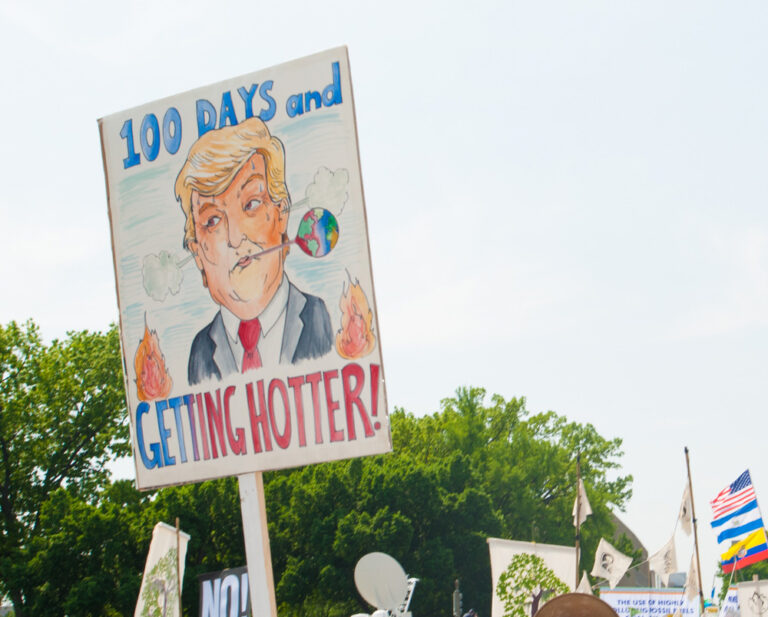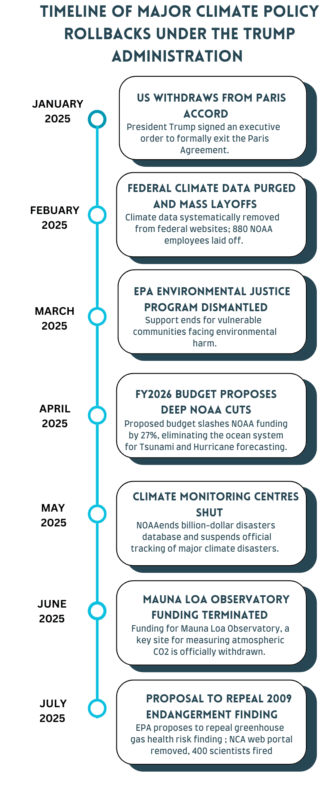Inside Trump’s campaign to censor climate science

As climate disasters intensify, the Trump administration is not just denying science, it is actively censoring it. Pallavi Sethi examines how efforts to erase climate data in the US undermine scientific institutions, threaten global climate preparedness and deepen inequalities in a warming world.
At a time when the global climate crisis is escalating, some governments are choosing to distort and conceal the evidence of its impacts. In the seven months since taking office, the Trump administration has been steadily erasing the evidence of climate science. This is no longer just a matter of denying science or delaying action, it is about controlling who gets to create, share, and access knowledge. It is an epistemic assault, one that we have seen happen before. In Canada, nearly a decade ago, Stephen Harper’s government silenced climate scientists and destroyed data. In 2012, the Venezuelan government removed environmental statistics from public view. And in Brazil in 2020, the Bolsonaro administration tried to discredit data related to deforestation and fired the officer behind it. These cases point to a disturbing pattern of governments trying to conceal facts, a phenomenon becoming increasingly blatant in the US.
Even as climate disasters become more frequent and extreme, such as the recent Texas floods that claimed 135 lives, the Trump administration is gutting the very systems needed to understand and respond to the crisis. Proposed budget cuts to federal agencies, like the Environmental Protection Agency (EPA), the National Oceanic and Atmospheric Administration (NOAA) and the National Aeronautics and Space Administration (NASA), are undermining their ability to monitor climate risks, develop solutions and protect communities. However, there is a growing movement where scientists and grassroot organisations have come together to protect crucial climate data.
Institutional climate censorship

The Trump administration is aggressively rolling back climate action, including erasing scientific data, slashing research funding, and removing terms like “climate change” from federal websites. In the proposed fiscal budget for 2026, the administration plans to cut NOAA’s budget by 27 per cent, which would end its Oceanic and Atmospheric Research (OAR). This could impact the country’s ability to accurately predict extreme weather. In the latest blow, the administration has proposed to repeal the EPA’s 2009 endangerment finding, the legal basis for nearly all federal climate regulations. The scientific finding, under the Clean Air Act, based on extensive evidence, concluded that greenhouse gases threaten public health and safety. The repeal would strip the EPA from regulating greenhouse gases from new vehicles, power plants, and other sources of pollution. If the rollback is carried out, it will be one of the most damaging environmental actions by a US government.
Another concerning target of the Trump administration has been the Mauna Loa Observatory in Hawaii, the longest-running station for measuring atmospheric carbon dioxide. The facility, which was launched in 1956, produced the Keeling Curve (a daily record of global atmospheric carbon dioxide concentration), and brought global attention to the rapid increase in greenhouse gas levels. Now, President Trump wants to shut this laboratory despite expert warnings that this move would impact the understanding of “how climate is changing, at what pace, and where.”
Beyond gutting regulations, the administration is also erasing scientific evidence. It has removed the online website that hosted the National Climate Assessment (NCA) reports, published every four years, and dismissed hundreds of staff working on the next edition. Without the NCA reports, cities could struggle to prepare for climate disasters.
The Trump administration’s actions represent a deliberate effort not just to discredit climate evidence but to suppress it entirely. It is also a rejection of evidence-based governance where both the scientific findings and the institutions responsible for producing them are systematically undermined.
These actions represent a deliberate effort not just to discredit climate evidence but to suppress it entirely. It is also a rejection of evidence-based governance where both the scientific findings and the institutions responsible for producing them are systematically undermined. Institutional censorship not only undermines scientific integrity but also erodes public trust in democratic institutions. This type of censorship can also affect international cooperation and slow progress, especially since the US is the second largest carbon emitter.
Impacts on the rest of the world
The suppression of climate data by the US government has global implications. The international scientific community depends on the US for critical data which helps in responding to climate disasters. Agencies such as NOAA, EPA and NASA have long been providers of free and publicly accessible information to experts all over the world. Since agencies like NOAA monitor vast areas, including entire oceans, researchers in the Global South, for instance, rely heavily on them to monitor and respond to environmental challenges. The Centre for Sustainable Development at the Indian Institute of Technology (IIT) in India uses NOAA’s climate datasets to track weather and ocean conditions in the Indian Ocean. The Institute uses this information to advise government agencies on how to best prepare and recover from natural disasters. Similarly, scientists at Singapore’s Earth Observatory rely on NOAA data to model and predict rising sea levels, which is critical for strengthening Singapore’s coastal resilience.
When a powerful country like the US withdraws from climate leadership, it risks sending a dangerous message to other nations that climate inaction is acceptable. This can embolden governments to scale back on their own efforts and undermine collective progress.
Disruptions to such data also risk deepening existing scientific and geopolitical inequalities. Many scientific institutions in wealthier nations may have the ability to develop robust data sources. However, many in the Global South lack the technical infrastructure and financial resources to do the same. Therefore, limiting access to US climate datasets can especially impact the ability of vulnerable nations to address climate change effectively. In addition, when a powerful country like the US withdraws from climate leadership, it risks sending a dangerous message to other nations that climate inaction is acceptable. This can embolden governments to scale back on their own efforts and undermine collective progress.
Data rescue efforts in the US and beyond
Despite efforts to suppress climate data, scientists and grassroots organisations are working together to protect this vital information. For instance, the Environmental Data and Governance Initiative archives data that affects the communities most at risk from Trump’s proposed policies. Other groups, such as the Public Environmental Data partners, are also helping by preserving essential tools like the Climate and Economic Justice Screening Tool, which the White House deleted. Such efforts go beyond American borders. The Max Planck Society for the Advancement of Science in Germany, the European Space Agency, and the National Centre for Scientific Research in France have archived data from US agencies like NOAA and EPA.
As the climate crisis worsens, it is concerning to see powerful governments censor scientific data. But the growing resistance from scientists, civil society and academic institutions proves that knowledge cannot be easily erased. It is also an important reminder that governments cannot be the sole custodians of scientific knowledge. Instead, we should view science as a shared and transnational public resource that we must protect and defend.
This commentary was first published on the LSE Impact Blog on 4 August and has been reproduced here with permission.

